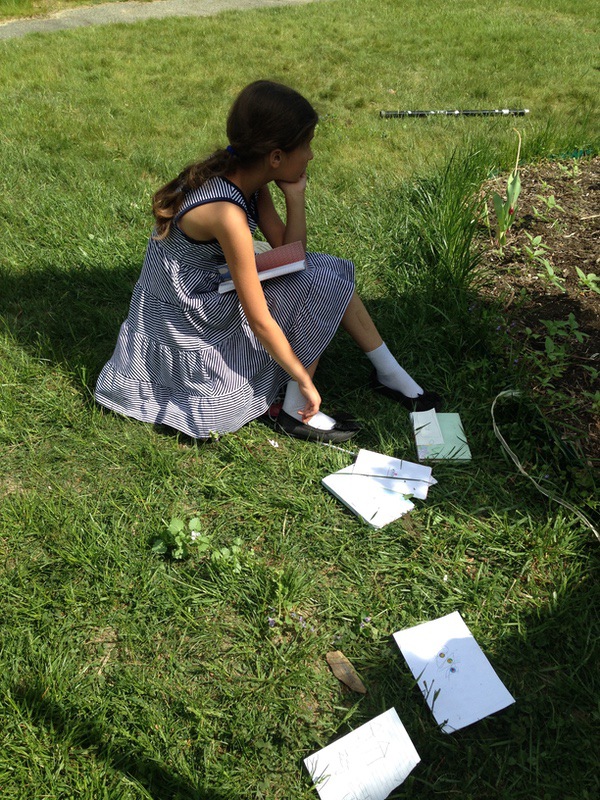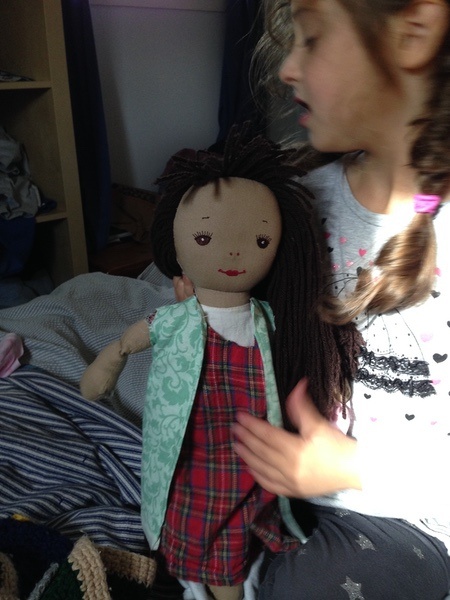Like most almost-two year-old boys, Ben is obsessed with trucks. His sisters are always eager to promote his obsession. One of his favorite library books is The Lot At the End of My Block, a rhyming book about a young boy observing the construction of a new building that features construction equipment. Bella and Sophie know exactly where it is on the shelf and are always eager to help Ben find it. (Even if Mama would rather he forgot about it for once.)
Of course, Bella has this cumulative tale memorized almost word perfect. The other day I was able to capture a brief video while she “read” it to Ben. The lighting is bad as they are backlit and the focus isn’t sharp and the sound isn’t great. I was nursing Anthony across the room. But it’s a sweet moment nonetheless.







Three year olds are very hard. Three year old girls are nearly impossible. Anyway, that is my experience, and I have gotten four girls past that age so far (one to go). It is a mini adolescence, and you have to treat it as such. The one big advantage you have over the real adolescence is that you are bigger and have total control over their environment. Three years old is a delightful time, if you set and keep boundaries, which takes unbelievable consistency, patience (losing your cool makes it worse), and diligence. This is made more challenging by the fact that there is often an infant involved in the equation (I’ll have that situation, again, soon). I could give you all kinds of advice if you want, about what to do to place and enforce boundaries, but that isn’t what you asked for, and unasked for advice is odious. Just let me know if I can help.
When my girls were that age, I remember thinking three was as bad as the “terrible” twos but with more language skills!
Hang in there.
Oh, this sounds so very, very familiar!We go through through the same thing, day in, day out. Bed time, while it’s a routine, is not ever peaceful. we have stories, prayers, lullabies and bed. Sounds great, right? Prayer time is a battle! She runs around, she refuses to be quiet, and she’s a rough and tumble young lady, so we have a few bruises by the end of most evenings (usually, I’m the one with the bruises). I have such a problem with consistency when i t isn’t yet bearing fruit! Prayers for you and your little one. Please pray for me and mine!
Thanks, everyone, for the sympathy, prayers and commiseration. It does help.
Katherine, Yes, demands for attention and testing boundaries are definitely a part of it. Very much so. Being sick has exacerbated it. And so has the fact that she’s currently giving up her naps.
Ah naps. Anne, you are definitely right about that. And I wasn’t really factoring that into the equation as I wrote these two pieces. In the past week Sophie has twice fallen asleep while cuddling with me during nap time. But at this point she will not be put down in her bed for a nap. And frankly I decided recently to stop fighting that particular battle. She’s at that sticky point where she really needs a nap only a couple of days a week and the others she’s fine without. For Bella that was a hard transition but it is worse for Sophie because there is the lure of an awake and active big sister to make her push herself to stay awake even on those days when she would truly benefit from a nap—witness yesterday’s delayed dinner time snooze.
Yes, I do realize that by disengaging from the nap time battle I’m not really reducing ht total amount of conflict in my day, only transferring the storm to dinner time instead of at nap time. But it means I do often have a quieter rest in the afternoon because Bella does much of the heavy lifting of entertaining Sophie—so long as they don’t fight and drag me in to referee.
Come September I’m going to have to draw up a new plan. What is our day going to look like if I want to devote some small part of it for focused attention on Bella’s schooling? How am I going to continue to enforce an afternoon quiet time as Anthony gets older and needs a dedicated nap? My ideal is the girls having an hour of sit quietly and read time. I’m not currently enforcing that because it’s not a battle I want to fight right now. But in the long term I do want that to be a permanent fixture in our day. How to make it happen? I suspect it will require heavy policing from me at first, which is why I’m postponing the implementation.
It sounds like it might be one of two things to me. One possibility is a demand for attention – does it seem to coincide at all with the arrival of Anthony? A second possibility is that, like any child, she is testing boundaries? “Can I get mom/dad to call me what I want? Restart grace? Move my chair? Etc.”
I don’t know Sophie beyond what you post but these both came to mind as possible reasons she is acting the way she is.
Three year olds are hard. Girls especially (at least in my house!). I wrote this about my little one last month:
http://martinfamilymoments.blogspot.com/2011/04/anybody-want-three-year-old-girl.html
She has seemed to come out the other side lately – so there’s hope
Melanie,
I agree with you about the difference between 2 and 3. When mine was 2 he was an angel, we even called him Angel-boy [still do]. Then 3 hit and I wondered where this little imp came from and where my angel had gone. I would say it was time to get dressed and he would run the opposite direction, i would say it was time to go and he’d insist [with tears and yelling, etc] that he wanted to stay, and then he wanted to leave. I agree with Katherine, it’s probably related to both a boundary testing issue and attention [and tiredness]. Mine is now 5 and still tests his boundaries, but you will be glad to note that it’s generally without the yelling and crying and he’s also better able to communicate what he’s really after. There are still some days that require a little room time, but they are much more rare than they were at 3.
It also seems to me that nap times were changing at 3. He didn’t want to nap, but he still needed one, but if he slept too long he wouldn’t sleep at night and then he’d be tired again the next day. My overall impression was that 3 was a hard age for him [and me] – he wasn’t a baby, but he wasn’t quite where he wanted to be yet – a big kid. I took him with me into the confessional once [dad had to work] and he was rambling around and playing with stuff while I confessed that I was less patient with him than I thought I should be and the whole time I’m trying to make a good confession I’m having to redirect him and say no and don’t do that and hold still [not great to take him with me but I really felt the need to go] and right after I spoke of patience he knocked the crucifix off the wall and onto his head, started crying etc. and the priest started to laugh and told me I was doing a great job and that he had just sent up a prayer for me to receive the extra graces of motherhood. It was all said with a laugh so I knew he was sympathizing for me and my wild little monkey. Prayers for you and yours to during this challenging time.
To Danae, I’m so sorry I accidentally hit the wrong button and deleted your comment. I can’t undo it; but I’ll repost it again. Melanie
Danae wrote:
I have a 5 year old and a 4 year old that no longer nap (and my two younger children do nap) so we have “quiet time” in our house. The two older ones go to separate rooms and listen to books on CD, play with Legos, color, etc, until quiet time is over. When I first started this, my oldest was 4, and I did have to remind him to stay in his quiet time room, but now they do just fine. We actually kind of welcome it because it is a chance to just have some alone time during the day and imagine. It is essential for me to recharge my batteries. And I agree that 3 year olds are hard!! Hang in there, because, as you know…it does get better.
Montessori educators talk about periods of “equilibrium” and “disequilibrium” in small children—the theory being, a child goes about six months feeling pretty happy about where they are, confident, OK with the balance of power between adults and herself, etc. Then there’s a developmental advance—whether in motor skills, language, or some combination—and this actually throws them into disequilibrium for another stretch of time, while they figure out what they are capable of, what their needs are, how much help they want, how much autonomy, etc. I think the theory is that each phase can last 4-6 months. I don’t know if it’s entirely true, but it helped me to think in terms of a phase my kids were going through, not that they or we had made a wrong turn somewhere and were going to be difficult forever.
Anyway good luck, and tell yourself she will pass through this stage into another someday soon!
Pat,
I agree thinking of things in terms of phases really helps. Seeing that other people’s kids went through a similar phase at about the same age definitely reassures me that it’s just developmental.
Danae,
We’ve been doing quiet time but I’ve let it slip in the past few weeks and that hasn’t helped. I hit a wall with Sophie’s nap and my own energy levels and the most important thing in the short terms seemed to be preserving my own quiet time and not spending it playing referee for theirs. I was having Bella sit and read or play quietly during naptime and it worked. But now that Sophie’s not napping I need to figure out hos to get her to do the same. Hard when they enjoy playing together; but I do need to expend the energy to separate them for at least part of the time and to make it a habit.